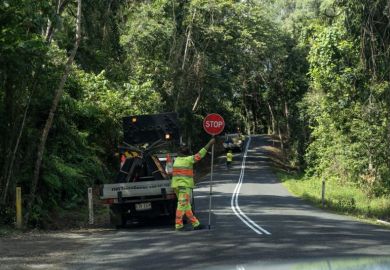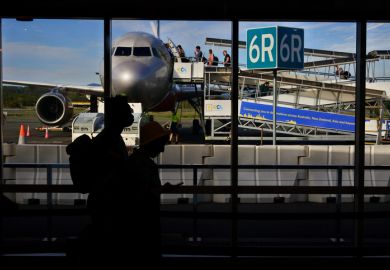Australian legislation to limit international enrolments is unlikely to fail a court challenge, but its “rushed” drafting will produce poor decisions, according to constitutional lawyer and university leader George Williams.
Professor Williams told a 26 August Senate committee hearing that the law could be vulnerable under Section 99 of the Constitution, which precludes the commonwealth from preferencing states over each other. But the federal government’s “consistent formula” for determining the caps, revealed the following day, removed that risk.
“It’s a generic, nationwide formula,” said Professor Williams, who became vice-chancellor of Western Sydney University (WSU) in July. “It’s now very hard to see there would be a constitutional issue because they’ve been consistent, as opposed to picking winners and losers.”
This applied even though the formula appeared to have benefited Tasmania while disadvantaging other regions. “There are winners and losers under a formula. It’s never equal. But as long as it’s a consistent formula applied without…state-based differences built in, then you’re not likely to have a problem.”
He said the legislation could still be vulnerable to court action on other grounds. Private institutions, for example, could mount a challenge over “acquisition of property”.
“The bill [has] a clause to deal with that, but I’m sure [private colleges] will be looking carefully, given how much is at stake for them.”
Professor Williams remained concerned that the legislation’s drafting would lead to poor outcomes. He said there appeared to be no option for WSU to argue for a higher cap on the grounds that it had space to accommodate more foreign students because of a 20 per cent vacancy rate in its residences.
“We’ve got a bed for every student, and that doesn’t seem to have been considered, because there’s no way for it to be considered. The formula doesn’t admit to those other considerations even though they’re driving this whole debate.”
He said this could have been averted if housing had been included within the “criteria” for decision-making. But the bill lacked criteria, along with a process for involving affected people and reasons for introducing the legislation in the first place.
Professor Williams said these “good practice” elements of bills were standard unless they pertained to emergencies such as pandemics – and required “decisive and quick decision-making” – or national security issues necessitating secrecy.
These “well-known exceptions…normally wouldn’t apply in higher education”, he said. “If you want wise decisions, criteria, process and reasons are very important. [Otherwise] you end up with quite blunt, somewhat arbitrary decision-making.
“We’ve got caps even before the act has been enacted. The Senate committee hasn’t even reported. We’re really putting the cart before the horse. It should be done better, given the massive stakes involved.”
He said WSU’s allocation of 3,400 international student commencements in 2025 was about 1,000 less than it had forecasted and would cost it about A$26.5 million (£13.6 million) next year. This would deprive the university of money to support “second chance” education for locals, Indigenous equity programmes, transnational education initiatives and food pantries for low-income students.
He said a decline in international student numbers also risked undermining local businesses and exacerbating skills shortages in the region.
Register to continue
Why register?
- Registration is free and only takes a moment
- Once registered, you can read 3 articles a month
- Sign up for our newsletter
Subscribe
Or subscribe for unlimited access to:
- Unlimited access to news, views, insights & reviews
- Digital editions
- Digital access to THE’s university and college rankings analysis
Already registered or a current subscriber?









